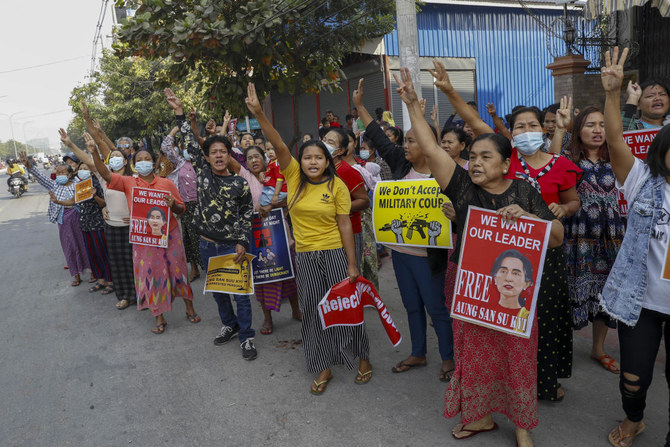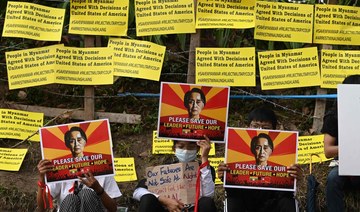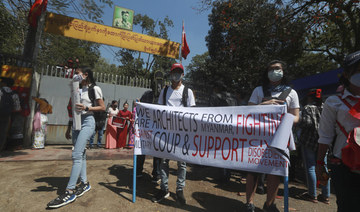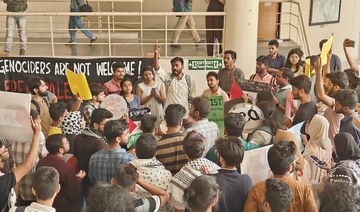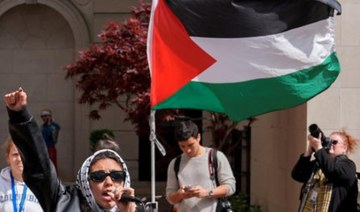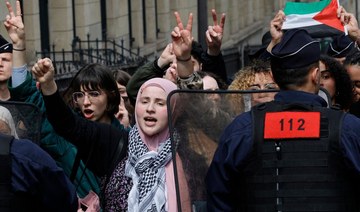Opponents of Myanmar’s military coup, including celebrities, veteran activists and students, rejected on Wednesday an army assertion that there was public support for overthrowing elected leader Aung San Suu Kyi, and said their campaign would not burn out.
Protesters are deeply skeptical of the junta’s assurances, given at a news conference on Tuesday, that there would be a fair election and it would hand over power, even as police filed an additional charge against Suu Kyi.
The Nobel Peace laureate, detained since the Feb. 1 coup, now faces a charge of violating a Natural Disaster Management Law as well as charges of illegally importing six walkie talkie radios. At a hearing by video conference on Tuesday, her next hearing was set for March 1.
“We’re showing here that we’re not in that 40 million they announced,” Sithu Maung, an elected member of Suu Kyi’s National League for Democracy (NLD) told a cheering crowd at the Sule Pagoda, a central protest site in the main city of Yangon.
Brig. Gen. Zaw Min Tun, spokesman for the ruling council, told the Tuesday news conference that 40 million of the 53 million population supported the military’s action, which he said was in line with the constitution. The army alleges there was fraud in a Nov. 8 election won by Suu Kyi’s party that had been expected to pave the way for democratic reform.
A protester who gave her name as Khin was scornful of that.
“What they said was totally untrue ... They said there was vote fraud but look at the people here,” said Khin.
The coup that cut short the Southeast Asian country’s unsteady transition toward democracy has prompted daily demonstrations since Feb. 6, some drawing hundreds of thousands of people.
The takeover has also drawn strong Western criticism, with renewed anger from Washington and London over the additional charge for Suu Kyi. Although China has taken a softer line, its ambassador in Myanmar on Tuesday dismissed accusations it supported the coup.
UN Special Rapporteur Tom Andrews said he feared the possibility of violence against the protesters and made an urgent call on any country with influence over the generals, and businesses, to press them to avoid it.
In Yangon and elsewhere, motorists responded to a “broken-down car campaign” spreading on social media, stopping their supposedly stalled cars, with bonnets raised, on streets and bridges to block them to police and military trucks.
“We want the truth ... and the release of Aung San Suu Kyi and President Win Myint,” said Ko Ye, 26, whose taxi was part of the break-down protest at the Sule Pagoda.
The president was also detained on the day of the coup.
Myanmar’s Assistance Association for Political Prisoners group said more than 450 arrests had been made since the coup, many of them in night-time raids. Those arrested include much of the NLD’s senior leadership.
The suspension of the Internet at night has added to a sense of fear.
Zaw Min Tun told the news conference, the junta’s first since the coup, the military was giving a guarantee that at an election would be held and power handed to the winner. He gave no time frame, but said the army would not be in power for long.
The last stretch of army rule lasted nearly half a century before democratic reforms began in 2011.
Suu Kyi, 75, spent nearly 15 years under house arrest for her efforts to end military rule.
The United States was “disturbed” by reports of the additional criminal charge against Suu Kyi, State Department spokesman Ned Price said. Washington imposed new sanctions last week on the Myanmar military. No additional measures were announced on Tuesday.
British Prime Minister Boris Johnson also decried the new criminal charge, saying it was “fabricated” by the military.
The unrest has revived memories of bloody suppression of protests under previous juntas.
Police have opened fire several times, mostly with rubber bullets, to disperse protesters. A protester who was shot in the head in Naypyitaw last week is not expected to survive.
A policeman died of injuries sustained during a protest in the city of Mandalay on Monday, the military said.
As well as the demonstrations in towns across the ethnically diverse country, a civil disobedience movement has brought strikes that are crippling many functions of government.
Activist Min Ko Naing, a veteran of 1988 protests that the military crushed, said the disobedience campaign was key this time.
“They think if the leader is arrested, nothing can be done, but that’s not working anymore,” he said in a taped message to the crowd.
Actor Pyay Ti Oo said opposition could not be doused.
“They say we’re like a brush fire and will stop after a while, but will we? No. Won’t stop until we succeed,” he told the crowd.
Myanmar coup opponents in big show of rejection of military claims
https://arab.news/4fr3y
Myanmar coup opponents in big show of rejection of military claims
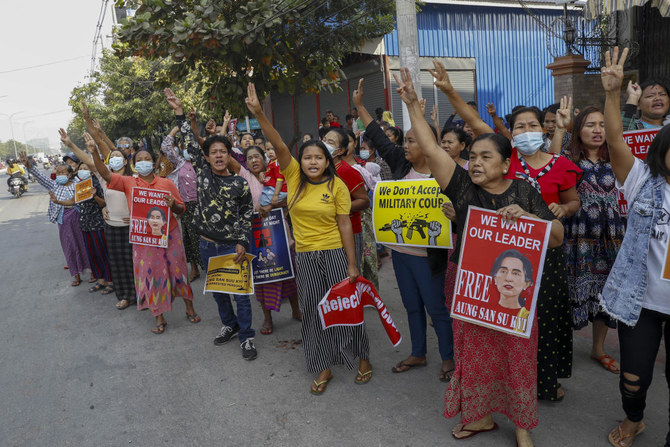
- Protesters are deeply skeptical of the junta’s assurances that there would be a fair election and it would hand over power
Police arrest Columbia students, clear occupied building in campus unrest
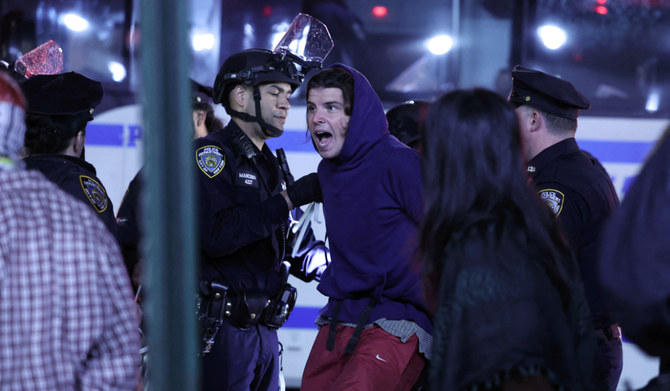
- Israel has killed more than 34,000 Palestinians, according to Gaza’s Health Ministry
- The protests have posed a challenge to university administrators trying to balance free speech rights with complaints that the rallies have veered into anti-Semitism and hate
New York, May 1, 2024 Agence France Presse: Dozens of helmeted police flooded Columbia University’s campus in the heart of New York City on Tuesday to evict a building occupied by pro-Palestinian student protesters and detain demonstrators.
Police climbed into Hamilton Hall via a second floor window they reached from a laddered truck, before leading handcuffed students out of the building into police vans.
The hall had been occupied at dawn by demonstrators who vowed they would fight any eviction, as they protested the soaring death toll from Israel’s war with Hamas in the Gaza Strip.
The action came as university administrators around the United States have struggled for weeks to contain pro-Palestinian demonstrations on dozens of campuses.
In a letter addressed to the New York Police department, Columbia University president Minouche Shafik said that the occupation of the school building was being led by “individuals who are not affiliated with the University” and asked “NYPD’s help to clear all individuals from Hamilton Hall and all campus encampments.”
She also asked the police to remain on campus through at least May 17, “to ensure encampments are not reestablished.”
Writing on Instagram, the protests slammed Shafik’s statement, saying “her use of the words ‘care’ and ‘safety’ are nothing short of horrifying.”
The weeks of demonstrations — the most sweeping and prolonged unrest to rock US college campuses since the Vietnam war protests of the 1960s and 70s — have already led to several hundred arrests of students and other activists.
Many of them have vowed to maintain their actions despite suspensions and threats of expulsion.
Earlier, protesters at Columbia were seen using ropes to hoist crates of supplies up to the building’s second floor, apparently signaling the students had planned to hunker down.
President Joe Biden’s White House had sharply criticized the seizure of Hamilton Hall, with a spokesman saying it was “absolutely the wrong approach.”
“That is not an example of peaceful protest,” the spokesman added.
The protests, with Columbia at their epicenter, have posed a challenge to university administrators trying to balance free speech rights with complaints that the rallies have veered into anti-Semitism and hate.
The unrest has swept through US higher education institutions like wildfire, with many student protesters erecting tent encampments on campuses from coast to coast.
At Columbia, demonstrators have vowed to remain until their demands are met, including that the school divest all financial holdings linked to Israel.
The university has rejected the demand. Columbia has warned that students occupying the building face expulsion.
In one of the newest clashes, at the University of North Carolina at Chapel Hill, police moved in Tuesday to clear one encampment, detaining some protesters in a tense showdown.
Meanwhile at northern California’s Cal Poly Humboldt, a week-long occupation was brought to a dramatic end early Tuesday when police moved in to arrest nearly three dozen protesters who had seized buildings and forced the closure of the campus.
In Oregon, Portland State University’s campus was closed Tuesday “due to an ongoing incident” in the library, college authorities said, after local media reported around 50 protesters had broken into the building a day earlier.
And Brown University reached an agreement in which student protesters will remove their encampment in exchange for the institution holding a vote on divesting from Israel — a major concession from an elite American university during the protests.
Footage of police in riot gear summoned at various colleges has been viewed around the world.
UN human rights chief Volker Turk voiced concern at the heavy-handed steps taken to disperse the campus protests, saying “freedom of expression and the right to peaceful assembly are fundamental to society.”
He added that “incitement to violence or hatred on grounds of identity or viewpoints — whether real or assumed — must be strongly repudiated.”
Shafik said many Jewish students had fled Columbia’s campus in fear. “Anti-Semitic language and actions are unacceptable,” she said.
The Gaza war started when Hamas militants staged an unprecedented attack on Israel on October 7 that left around 1,170 people dead, mostly civilians, according to an AFP tally of Israeli official figures.
During their attack, militants also seized hostages, 129 of whom Israel estimates remain in Gaza, including 34 whom the military says are dead.
Israel’s retaliatory offensive has killed at least 34,535 people in Gaza, mostly women and children, according to the Hamas-run territory’s health ministry.
House Republicans launch investigation into federal funding for universities amid campus protests
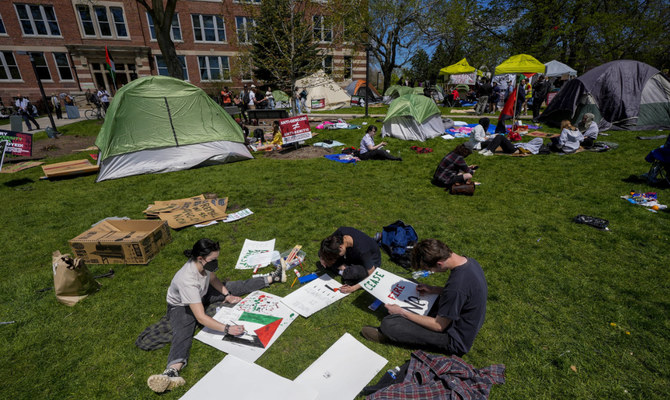
- Nationwide, campus protesters have called for their institutions to cut financial ties to Israel
WASHINGTON: House Republicans on Tuesday announced an investigation into the federal funding for universities where students have protested the Israel-Hamas war, broadening a campaign that has placed heavy scrutiny on how presidents at the nation’s most prestigious colleges have dealt with reports of antisemitism on campus.
Several House committees will be tasked with a wide probe that ultimately threatens to withhold federal research grants and other government support to the universities, placing another pressure point on campus administrators who are struggling to manage pro-Palestinian encampments, allegations of discrimination against Jewish students and questions of how they are integrating free speech and campus safety.
The House investigation follows several recent high-profile hearings that precipitated the resignations of presidents at Harvard and the University of Pennsylvania. And House Republicans promised more scrutiny, saying they were calling on the administrators of Yale, UCLA and the University of Michigan to testify next month.
“We will not allow antisemitism to thrive on campus, and we will hold these universities accountable for their failure to protect Jewish students on campus,” said House Speaker Mike Johnson at a news conference.
Nationwide, campus protesters have called for their institutions to cut financial ties to Israel and decried how thousands of civilians in Gaza have been killed by Israel following the deadly attack by Hamas on Oct. 7.
Some organizers have called for Hamas to violently seize Israeli territory and derided Zionism. Jewish students, meanwhile, have reported being targeted and say campus administrators have not done enough to protect them.
After Johnson visited Columbia last week with several other top House Republicans, he said “the anti-Jewish hatred was appalling.”
Republicans are also turning to the issue at a time when election season is fully underway and leadership needs a cause that unites them and divides Democrats. The House GOP’s impeachment inquiry into President Joe Biden has fallen flat and the Republican conference is smarting after a series of important bills left GOP lawmakers deeply divided. Democrats have feuded internally at times over the Israel-Hamas war and how campus administrators have handled the protests.
Senate Majority Leader Chuck Schumer, a New York Democrat, said in a floor speech Tuesday that it was “unacceptable when Jewish students are targeted for being Jewish, when protests exhibit verbal abuse, systemic intimidation, or glorification of the murderous and hateful Hamas or the violence of October 7th.”
Rep. Pete Aguilar, the No. 3 House Democrat, at a news conference Tuesday said that it was important for colleges “to ensure that everybody has an ability to protest and to make their voice heard but they have a responsibility to honor the safety of individuals.”
“For many of Jewish descent, they do not feel safe, and that is a real issue,” he said, but added that he wanted to allow university administrators to act before Congress stepped in.
But the Republican speaker promised to use “all the tools available” to push the universities. Johnson was joined by chairs for six committees with jurisdiction over a wide range of government programs, including National Science Foundation grants, health research grants, visas for international students and the tax code for nonprofit universities.
Without Democratic support in the divided Congress, it is not clear what legislative punishments House Republicans could actually implement. Any bills from the House would be unlikely to advance in the Democratic-controlled Senate.
But so far, the House hearings with university presidents have produced viral moments and given Republicans high-profile opportunities to denounce campuses as hotbeds of antisemitism. In December, the presidents of Ivy League universities struggled to answer pointed questions about whether “calling for the genocide of Jews” would violate each university’s code of conduct.
Rep. Elize Stefanik, the New York Republican who posed the question in the December hearing, said it became the highest-viewed congressional hearing in history. She also cast the campaign against antisemitism as part of a broader conservative push against what they say is overt liberal bias at elite American universities.
“Enough is enough,” she said. “It is time to restore law and order, academic integrity and moral decency to America’s higher education institutions.”
The House Committee on Education and the Workforce is also requesting that the administrators of Yale, UCLA and the University of Michigan appear at a hearing on May 23 that focuses on how they handled the recent protests.
“As Republican leaders, we have a clear message for mealy-mouthed, spineless leaders: Congress will not tolerate your dereliction of duty to your Jewish students,” said the committee chair, North Carolina Rep. Virginia Foxx.
At a hearing of the committee earlier this month, Columbia University’s president took a firm stance against antisemitism. But at the same time, a protest was underway on Columbia’s campus that would soon set off others like it nationwide. The university began suspending students this week in an attempt to clear the protest encampment on campus.
The university is also facing federal legal complaints. A class-action lawsuit on behalf of Jewish students alleges Columbia breached its contract by failing to maintain a safe learning environment.
Meanwhile, a legal group representing pro-Palestinian students is urging the US Department of Education’s civil rights office to investigate whether Columbia’s treatment of the protesting students violated the Civil Rights Act of 1964.
Senate Republican Leader Mitch McConnell called on university administrators to “take charge.”
“On campus, protect Jewish community members. Clear the encampments. Let students go to class and take their exams. And allow graduations to proceed,” he said.
US newspapers sue OpenAI for copyright infringement over AI training

- The newspaper cases are among several potential landmark lawsuits brought by copyright owners against tech companies over the data used to train their generative AI systems
WASHINGTON: A group of newspapers, including the New York Daily News and Chicago Tribune, sued Microsoft and OpenAI in New York federal court on Tuesday, accusing them of misusing reporters' work to train their generative artificial-intelligence systems.
The eight newspapers, owned by hedge fund Alden Global Capital's MediaNews Group, said in the lawsuit that the companies unlawfully copied millions of their articles to train AI products, including Microsoft's Copilot and OpenAI's ChatGPT.
The complaint follows similar ongoing lawsuits against Microsoft and OpenAI, which has received billions in financial backing from Microsoft, brought by the New York Times and news outlets The Intercept, Raw Story and AlterNet.
An OpenAI spokesperson said on Tuesday that the company takes "great care in our products and design process to support news organizations." A spokesperson for Microsoft declined to comment on the complaint.
The newspaper cases are among several potential landmark lawsuits brought by copyright owners against tech companies over the data used to train their generative AI systems.
A lawyer for the MediaNews publications, Steven Lieberman, told Reuters that OpenAI owed its runaway success to the works of others. The defendants know they have to pay for computers, chips, and employee salaries, but "think somehow they can get away with taking content" without permission or payment, he said.
The lawsuit said Microsoft and OpenAI's systems reproduce the newspapers' copyrighted content "verbatim" when prompted. It said ChatGPT also "hallucinates" articles attributed to the newspapers that harm their reputations, including a fake Denver Post article touting smoking as an asthma cure and a bogus Chicago Tribune recommendation for an infant lounger that was recalled after being linked to child deaths.
The plaintiffs also include the Orlando Sentinel, South Florida Sun-Sentinel, San Jose Mercury News, Orange County Register and Twin Cities Pioneer Press. They asked the court for unspecified monetary damages and an order blocking any further infringement.
UN Human Rights Chief troubled by ‘heavy-handed’ action against protesters at US colleges
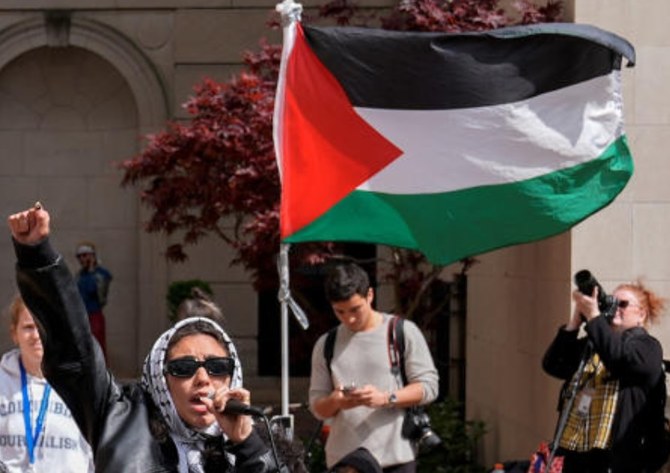
- Volker Turk says ‘freedom of expression and the right to peaceful assembly are fundamental to society, particularly when there is sharp disagreement on major issues’
- Protests have taken place on campuses in several states as students demand colleges withdraw investments from businesses involved in Israel’s assault on Gaza
NEW YORK CITY: The UN’s high commissioner for human rights on Tuesday said he is troubled by “a series of heavy-handed steps” taken by education authorities and law enforcement officials to break up protests at college campuses in the US.
Volker Turk said: “freedom of expression and the right to peaceful assembly are fundamental to society, particularly when there is sharp disagreement on major issues, as there are in relation to the conflict in the Occupied Palestinian Territory and Israel.”
Pro-Palestinian demonstrations have spread across college campuses in Texas, New York, Atlanta, Utah, Virginia, New Jersey, California and other parts of the US as students protest against the death toll during the war in Gaza, call for a ceasefire and demand authorities at their colleges withdraw investments from businesses involved in Israel’s military assault on Gaza.
Though largely peaceful, at some locations the protests have been dispersed or dismantled by security forces. Hundreds of students and teachers have been arrested, some of whom face charges or academic sanctions.
Turk expressed concern that some of the responses by law enforcement authorities at several colleges might have been disproportionate, and called for such actions to be scrutinized to ensure they do not exceed what is necessary “to protect the rights and freedoms of others.”
He added that all such actions must be guided by human rights law, while “allowing vibrant debate and protecting safe spaces for all.”
He reiterated that antisemitic, anti-Arab and anti-Palestinian activities and speech are “totally unacceptable, deeply disturbing (and) reprehensible.” However, the conduct of protesters must be assessed and addressed individually rather than through “sweeping measures that impute to all members of a protest the unacceptable viewpoints of a few,” Turk added.
“Incitement to violence or hatred on grounds of identity or viewpoints, whether real or assumed, must be strongly repudiated. We have already seen such dangerous rhetoric can quickly lead to real violence.”
Poland says it is probing alleged links between Orlen unit’s ex-CEO and ‘terrorist organizations’
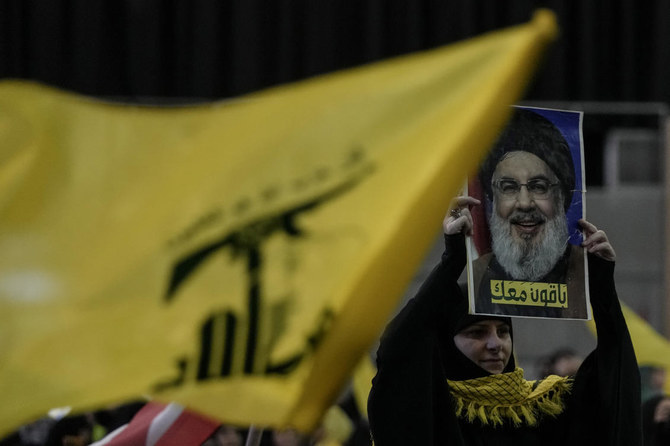
- Polish website Onet had reported on Monday that the former CEO of Orlen Trading Switzerland was suspected by Orlen’s internal security unit of having had contacts with Hezbollah
- The ex-CEO denied in an interview with Polish private radio RMF on Tuesday that he had any connections with Hezbollah
WARSAW: Poland has launched an investigation into multi-million-dollar cash losses by Polish refiner Orlen’s Swiss unit and allegations that its former CEO had ties to “terrorist organizations,” Warsaw chief prosecutor Malgorzata Adamajtys said on Tuesday.
Polish website Onet had reported on Monday that the former CEO of Orlen Trading Switzerland, referred to only as Samer A. due to local privacy laws, was suspected by Orlen’s internal security unit of having had contacts with Lebanon’s powerful Iran-backed Hezbollah militant group.
Samer A., the ex-CEO of Orlen’s Swiss subsidiary OTS, denied in an interview with Polish private radio RMF on Tuesday that he had any connections with Hezbollah.
“I have been to Poland many times, I am a Polish citizen, I have a Polish passport. I am treated by the current authorities as a second-class citizen,” he said, adding that though he was currently abroad, he was not hiding from Polish law enforcement.
Asked at a press conference for details of the investigation, chief prosecutor Adamajtys said: “We are looking into all information, some of which is known to prosecutors from the press, radio and television, including on connections with terrorist organizations.”
Western countries including the US designate Hezbollah as a terrorist organization. The European Union classifies Hezbollah’s military wing as a terrorist group, but not its political wing.
Adamajtys said OTS was established as a business despite a warning by Orlen’s internal security unit not to do so. It operated, according to Adamajtys, without proper supervision, documentation and verification of contractors. She said this showed that Samer A. should not have been appointed as CEO.
“A person who makes advance payments without completion of the first tranches of certain deliveries is not a good CEO and should not be the CEO of this or any other company,” she said.
Reuters sought to contact Samer A. for comment on Adamajtys’ remarks about OTS operations, but he could not be reached. In his conversation with RMF, he denied that there had been any warning from Orlen’s internal security unit.
OTS LOSSES
Orlen has said OTS was behind the loss of around $400 million linked to contracts to buy Venezuelan oil and oil products.
OTS has said it tried to benefit from a temporary window in US sanctions against Venezuela and paid cash advances to intermediaries it never worked with before. The contracts were canceled, it said, as a closure of the window was nearing, and tankers weren’t loading.
Orlen has said it is currently auditing OTS operations.
Adamajtys said Orlen also faced questions over the alleged manipulation of fuel prices to artificially low levels ahead of last year’s national election and a sale of some assets that investigators suspect were below market level.
In February, Orlen rejected an allegation of below-market asset sales from the state audit office, saying it gained as much as 9 billion zloty ($2.2 billion) in one corporate merger. The company also denied lowering fuel prices artificially.
Samer A. has been charged in a separate probe with VAT fraud between 2008-2013, a regional prosecutor in Bydgoszcz said on Monday. He was detained by police and questioned by a prosecutor in February, and released on bail, the prosecutor added.
Opposition critics said that under the previous, nationalist Law and Justice (PiS) government, which lost power in that vote, Orlen had helped financed the party’s policy agenda, including taking control of some media outlets.
On Monday, Prime Minister Donald Tusk said he had called the country’s chief prosecutor and secret services coordinator to discuss potential links between the former CEO of Orlen, Daniel Obajtek, and Hezbollah.
Obajtek, a close associate of PiS leader Jaroslaw Kaczynski, responded on social media platform X that Tusk was “looking for scandals where there are none.”
Polish media have reported that PiS might put up Obajtek as a candidate in June’s European Parliament election.


